Last updated: July 7, 2023
I was working with some horses when my cousin and his son visited. His youngest son was absolutely fascinated by the horses and wanted to know how he could become a trainer. I told him it takes a lot of hard work, but if he was dedicated enough, he could definitely make it happen.
There is no one path to becoming a horse trainer. Some people may start out their careers as stable hands or groomers and work their way up, while others may have extensive experience working with horses before becoming trainers. However, many trainers have a degree in animal science or equine management.
In this blog post, I discuss what education or experience you need to become a horse trainer, what a horse trainer does, how much money you can make as a horse trainer and much more. Keep reading to learn more.

What education or training is required to become a horse trainer?
There is no specific education or training required to become a horse trainer. However, having a strong background in horses and horse care and experience working with horses is important.
Additionally, many trainers obtain certification from organizations such as the American Riding Instructor Association (ARIA) or the National Association of Certified Horsemanship Instructors (NACHI).
Pursuing a college certificate or degree in a subject related to horse training is one of the most common ways to begin a career in this field. Students can learn how to properly care for horses and train them by enrolling in 2- or 4-year equine science or equestrian management programs at some educational institutions.
If you can’t find a degree program in your region focused on equine studies, look for a college with an intercollegiate riding or rodeo team that may also provide you with relevant experience. This experience can be combined with a degree in animal sciences or ranch management.
When pursuing a career as a horse trainer, having previous experience working with and riding horses is the most crucial credential you can have. Those interested in becoming horse trainers should devote a significant amount of their time to participating in riding classes and, preferably, competing in equestrian sports events.
Beginning your career as a horse trainer at an entry-level position at a farm or stable can be very beneficial since you will acquire invaluable experience caring for and riding horses. You may even be able to work under the guidance of an established trainer.
This is because working with and riding horses will provide you with invaluable insight into both of these areas. In addition to gaining experience working with horses at a stable or farm and earning a degree, some individuals interested in becoming horse trainers find that obtaining sport- or breed-specific qualifications makes them more competitive for open positions.
For instance, the United States Hunter Jumper Association (USHJA) confers a certification upon trainers who demonstrate expertise in preparing horses for hunting and jumping competitions. The Certified Horsemanship Association allows candidates to earn certificates that include broad and narrow aspects of training.
Below is an informative YouTube video about horse training.
What is a horse trainer?
A horse trainer is someone who trains horses for a particular purpose, such as in racing, show jumping, dressage, polo, or working purposes. There are many different types of horse trainers.
Some specialize in breaking horses and teaching them basic riding cues. While others may specialize in training experienced horses to jump high fences or perform complex dressage movements.
Still, others may specialize in training horses to be safe and reliable partners for people who want to go trail riding or participate in other recreational riding activities. The main goal of all horse trainers, regardless of specialization, is the same: train the horse to be safe and responsive under saddle so the rider can enjoy a smooth and rewarding ride.
Additionally, horse trainers are responsible for all aspects of the horse’s health, including its physical activity and diet. Some also instruct riders on how to work with horses.
Horse trainers instruct and train horses to assist them in becoming accustomed to human contact, responding to commands, communicating with the rider, and gaining behavioral control.
What does a horse trainer do?
In addition to working with the horse, horse trainers also work closely with the owners and riders to develop a structured training program that meets the specific needs of their horses.
In addition, horse trainers play an important role in the care and management of horses. They are responsible for teaching horses basic obedience commands and, if needed, more specialized skills, such as dressage and jumping.
Here are some of the responsibilities of a horse trainer:
- Developing a work schedule for horses
- Dealing with owners and riders
- Ordering feed and supplies
- Sending out bills
- Entering horses in competitions.
- Scheduling transportation for horses
- Managing staff
- Examing horses to ensure they are healthy and up to date on vaccinations and other healthcare treatments.
- Ensuring each horse is on a healthy diet.
- Teaching horses how to perform a variety of exercises.
- Ensuring horses are groomed correctly.
- Instruction geared for the reduction of behavioral issues.
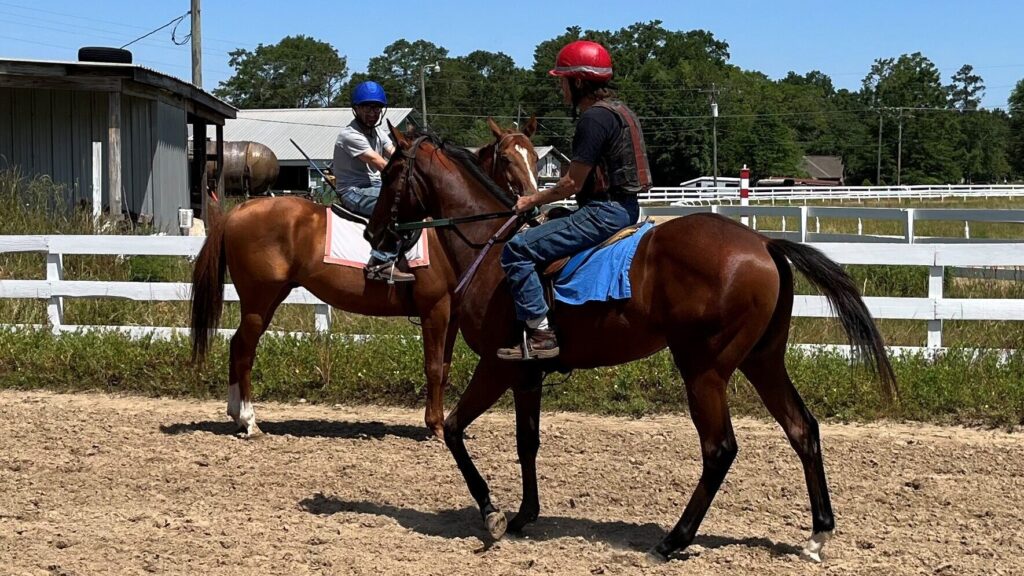
Where do horse trainers work?
Horse trainers work in various locations, including private training facilities, racing stables, and equestrian centers. Some horse trainers also travel to various competitions or shows to oversee the care and training of the horse while away from their home base.
But, regardless of where they work or what type of horses they train, all horse trainers share one common goal: to help their charges reach their full potential. To achieve this, trainers must have a deep understanding of horse behavior and psychology and the ability to develop a strong bond with their charges.
In addition, trainers must be able to identify and correct problems quickly and effectively. Only by meeting all of these challenges can a trainer hope to be successful in this demanding field.
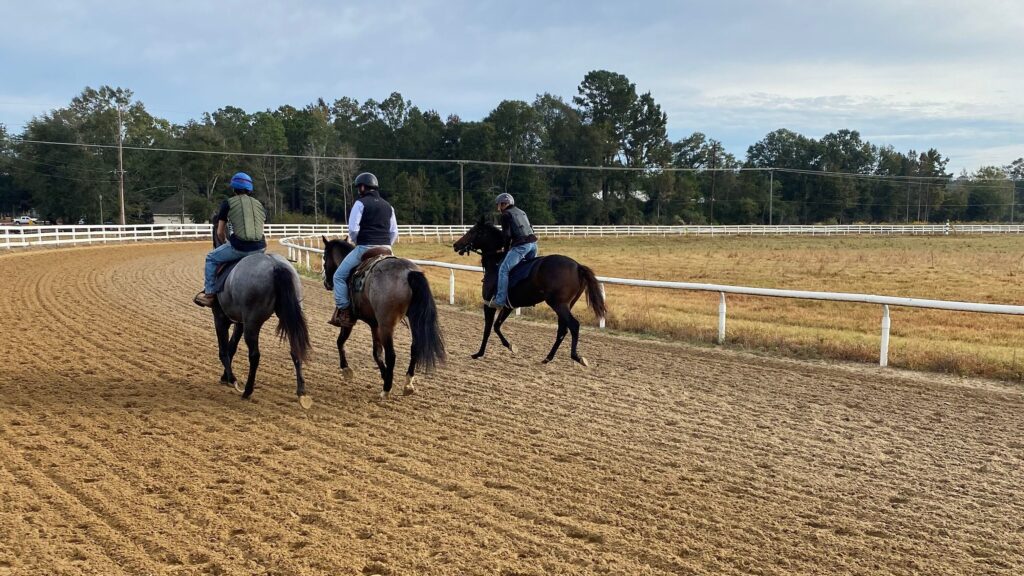
Private equine facility
Some horse trainers work at privately owned equine facilities, from small family farms to large boarding and training operations. Some privately owned equine facilities offer various services, including boarding, training, and lessons.
Horse trainers at private facilities typically have more experience working with different types of horses and are able to offer a higher level of training. They may also be able to offer a more customized training program that is tailored to the needs of the individual horse.
In addition, these trainers often have access to better facilities and equipment. As a result, they are able to provide better care for their horses. However, private trainers typically charge more for their services.
We keep our horses at a private facility. It is set up similarly to a condo association; each on-site barn owner must pay a monthly maintenance fee for track and ground maintenance.
Below is a YouTube video of our young racehorse being trained to break from the gates.
Open to the public.
New Orleans has several public facilities where you can pay to keep and ride your horses. The trainers are hired by the individuals to work with them at the facility. Typically, horse trainers give riding lessons and organize group riding sessions at a public stable. They don’t normally board or train horses there.
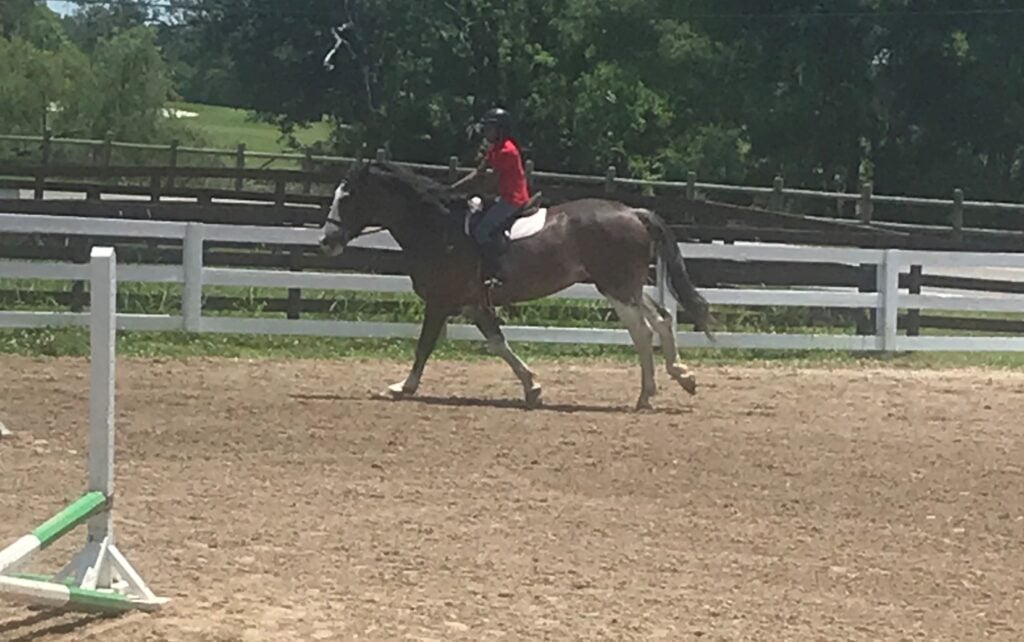
What are the most important qualities of successful horse trainers?
Patience, dedication, and a love for horses are some of the most important qualities of a successful horse trainer. It takes a lot of patience to work with horses day in and day out, as they can be difficult to train.
However, the rewards of being a horse trainer are well worth the effort. Those dedicated to their job and who have a true passion for horses often find the most success. They also tend to form strong bonds with their horses, which helps to create an overall positive training experience.
Ultimately, it is important to remember that every horse is different and must be trained in a way that suits its individual personality and needs. By keeping these things in mind, any horse trainer has the potential to be successful.
Traits you need to be a horse trainer.
Horse training is an art and a science. It requires an understanding of horse behavior as well as a deep bond with the animal. A successful trainer must be able to read a horse’s body language and communicate effectively, using both body language and voice commands.
They must also have the patience to work slowly and carefully, building trust and respect over time. In addition, horse trainers must be physically strong and confident, able to handle horses of all sizes and temperaments.
Finally, they must be dedicated and willing to work long hours to achieve results. Those with these traits often find that they have a natural affinity for horses and that training is a deeply rewarding experience.
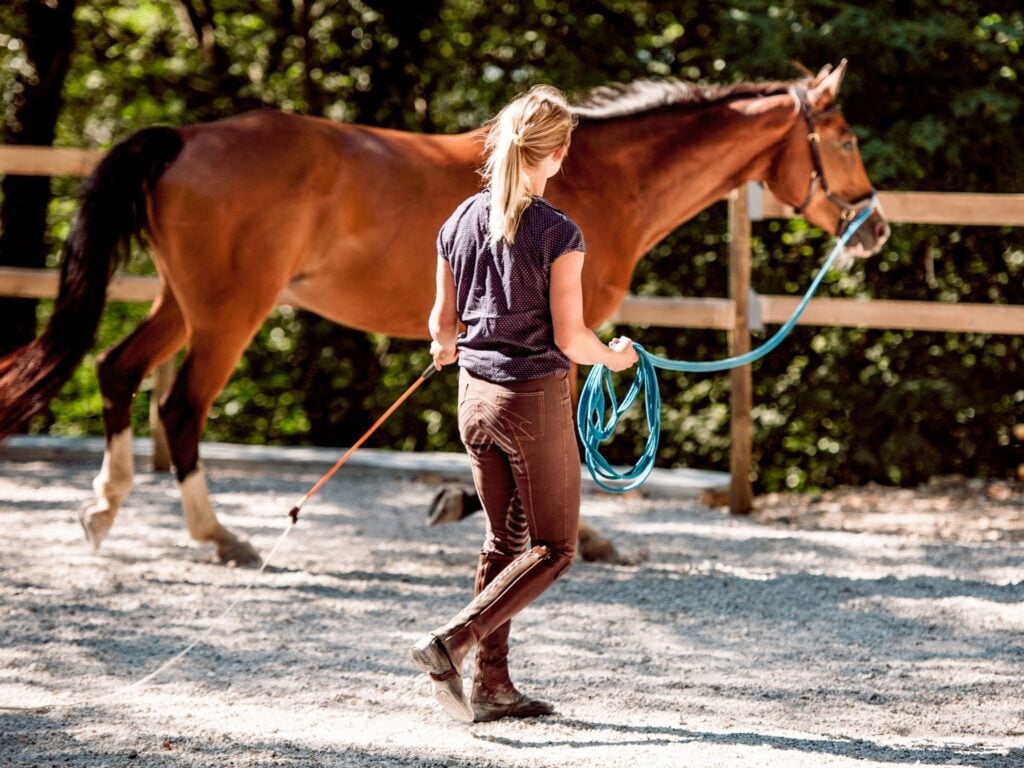
What kind of equipment do you need to train horses?
Training a horse takes time, patience, and the right equipment. Regarding tack, you’ll need a saddle, bridle, and bit that fit both you and the horse comfortably. You’ll also need a few simple grooming supplies, such as a brush and hoof pick.
In terms of equipment for basic training, you don’t need much else except a lunging line and whip. The lunging line attaches to the horse’s halter and allows you to control the horse while he or she is working out.
The whip is used to cue the horse during training exercises. In addition, many trainers use barrels and poles to help teach horses how to maneuver around obstacles. With the proper equipment, you’ll be well on your way to training a happy and healthy horse.
For more advanced training or if you are committed to a particular equine activity, you may want to invest in a round pen. Round pens are an excellent investment that will help you immensely with the training of your horse.
We often use a round pen when getting on a young horse for the first time or when we have a problem horse. Round pens are a great tool for trainers, but they aren’t required; we went years without having one.

How much do horse trainers make?
The salary range for horse trainers in the United States lies typically between $33,396 and $42,650, with an average of $37,777 as of October 27, 2022. Only the very best trainers earn more than $55,000 per year.
A person’s education level, certifications, supplementary talents, and length of time spent working in their field, as well as their overall level of experience, can significantly impact the salary range they can expect.
However, the issue is not relatively as straightforward as it may seem, given that horse trainers rarely subsist only on salaries. They frequently look for other opportunities based on their expertise, skill levels, and location to compensate for the fact that these payments are not exceptionally high.
What are the challenges of being a horse trainer?
Pressure on the body
The work involves standing for lengthy periods and performing physical tasks such as grooming horses and moving big pieces of equipment. Both training and riding horses can be physically hard activities, mainly if the horse is unruly or difficult to control.
This is especially true if you do a lot of your own maintenance, like trimming hooves, riding, and cleaning stalls. After trimming one horse, my back gets tight, so I only do it when no one else is available.
Possible injuries
Horse trainers frequently have to deal with horses that are fearful or violent. Because horses are so huge, even the slightest amount of force exerted by them can significantly harm their handlers.
Horses can bite, kick, or trample their trainers if frightened or agitated. Because of this, workers in the horse training industry have a significantly higher chance of being hurt or killed on the job than employees in virtually any other industry.
We currently have a young filly that has kicked a couple of the grooms and tried to paw one person. She is trouble for strangers and not really easy for the trainer to handle. We plan to work with her in the round pen for a couple of weeks to prevent her from seriously injuring someone.
Financial Investment
To pursue a career as a horse trainer, one must also make a significant financial commitment. You will not only need to own horses or have access to them, but you will also need to invest in the essential equipment and pursue additional schooling or certification.
Working with horses can be emotionally stressful because of the direct connection between your profession’s success and the horses’ health and performance.
A Complicated Schedule and High Expectations
The Bureau of Labor Statistics reports that many stables have someone there at all times. When working under such conditions, horse trainers may be required to work nights, weekends, and holidays. The timetable of a horse trainer who works in a facility open around the clock can shift significantly from one week to the next.
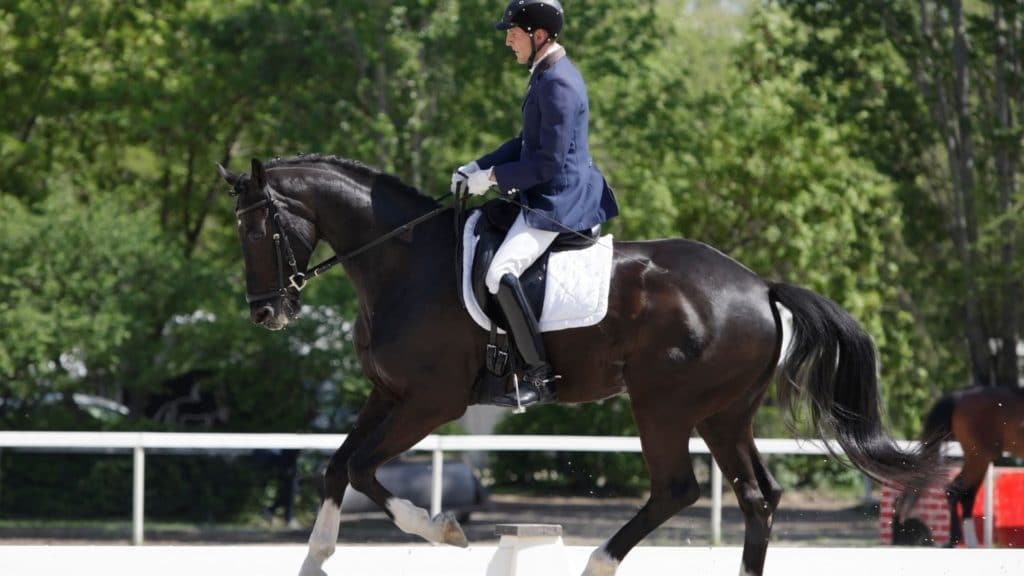
The three most common types of events horses trainers work in.
There are three main types of events that horse trainers work Western, English, and racing. Each type of equine event requires different training methods and techniques. Western events include barrel racing, roping, and Western pleasure. English events include dressage, show jumping, and eventing.
Horse racing is its own category and includes both Thoroughbred and quarter horses, and trainers work to prepare horses for both sprints and long-distance races.
Each type of event requires a different set of skills, so it is important for trainers to be familiar with the requirements of each before they begin working with a horse.
For example, western event horses need to be able to control their speed and turn quickly, while English event horses need to be agile, athletic, and intelligent. Racehorses need to be able to sustain high speeds for long stretches.
By understanding the specifics of an event, trainers can help their horses reach their full potential in their chosen discipline. Because of the intricacies of horse events, most trainers specialize in one.
Conclusion
So, if you are passionate about horses and want to make a career out of working with them, becoming a horse trainer may be the perfect option for you. It is important to note that there are many different paths you can take to become a horse trainer.
Various education and training options are available, so do your research to find the program that best suits your needs. Horse trainers work in many different environments and need to possess certain personal qualities to be successful.
FAQs
Is being a horse trainer a good career?
Yes, being a horse trainer can be a very good career. Horse trainers typically have a deep love and passion for horses, and they enjoy working with them to help improve their skills and performance. However, the money isn’t always great.
How long does it take to become a horse trainer?
It takes a lot of dedication, hard work, and skill to become a horse trainer. Most people who are successful in this career spend years training and working with horses before becoming a professional.

About the Author: Miles Henry
Lifelong Horseman | Racehorse Owner | Published Author
Miles Henry brings over 25 years of hands-on experience training and owning Thoroughbred racehorses. Raised with Quarter Horses and Appaloosas, he’s spent a lifetime learning from horses—on the track, in the barn, and in the field. Today, he runs a small but successful racing stable in Louisiana and shares real-world insights on HorseRacingSense.com, helping horse owners, fans, and bettors navigate the sport with confidence.
📚 Books: View Miles’s books on Amazon »
🎧 Podcast Guest: Animal Tales Ep. 32 |
YouTube Interview
📩 Newsletter: Sign up for racing tips and horse care advice »
🔗 Follow Miles:
Twitter |
Facebook |
YouTube



